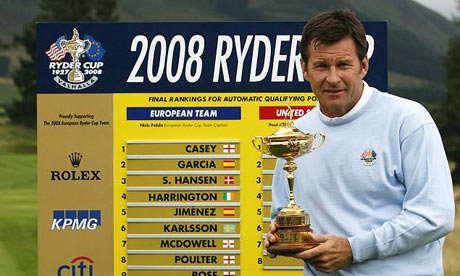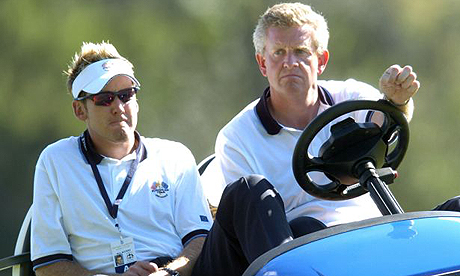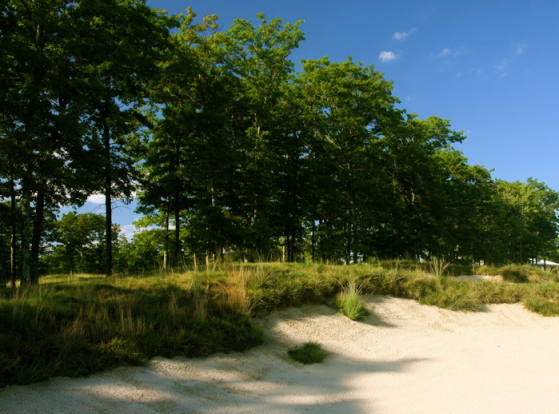Faldo Insists Sarah Palin Was Never Considered For Euro Ryder Cup Team
/ The British press is having fun now. The early verdicts on the Poulter selection...
The British press is having fun now. The early verdicts on the Poulter selection...
Lawrence Donegan offers probably the most sympathetic perspective:
The irony is that there really was a strong case for choosing Poulter over Clarke, or Casey for that matter. For one thing, he is a fabulous competitor. More crucially, he is a fabulous putter - the most important attribute any player can bring to a Ryder Cup. He finished 12th in the qualification rankings and, at No23 in the world, was the highest ranked player who had not played himself into an automatic spot.
Most people could marshal these facts, and a few others, to make an insurmountable case for Poulter, but not Faldo.
Remarkable for someone who makes his living as a TV commentator these days, the Englishman is uncomfortable under the glare of the cameras and, thus far into his captain's role, has made the famously tongue-tied Ian Woosnam sound like Winston Churchill. Yet on this occasion his hesitation might have had more to do with the fact that he was hiding a deeper truth - that his selections may have had little to do with form and a lot to do with personality.
And shares this about Monty:
Faldo was sympathetic to those left out, especially when it came to Clarke. "Darren made a massive, massive charge, a big effort the last few weeks. It's a tough call - some will agree, some will disagree. I briefly spoke to Darren and you could sense he was disappointed," he said.
"Monty, I only managed to leave a voice message - apparently he was watching football or shopping. My run came to an end and the first one you miss it stinks. Monty's had an historic career, but unfortunately his summer wasn't great and he's finished down the list."Derek Lawrenson reports that Bernard Gallacher suspects the pick was a mistake.
'I am shocked,' said Gallacher. 'A lot of people were very surprised that Ian didn't come back and fight for his place, and I think team morale will be a bit lower for picking him over Darren, who tried so hard to make it.James Corrigan in the Independent doesn't sound too high on the selection:
'I felt Darren and Paul Casey were certainties to be his picks. But Nick's always been a bit controversial and he's certainly lived up to that.'
In ignoring the seemingly irresistible claims of Darren Clarke and picking Ian Poulter alongside Paul Casey as his two wild cards, Faldo left himself exposed to criticism, from both inside and outside the team room.Lewine Mair in the Telegraph notes the cozy ties between Faldo and Poulter.
Poulter may have finished second in the Open at Birkdale in July but elsewhere he has recorded just one top 10 finish all season and that came in Abu Dhabi in January. He has not shot a single round under 68 since then. In fairness, the flamboyant Englishman has been consistent in racking up the top-30s and, as Faldo pointed out: "He was the highest ranked player who had not already made the team." Undeniably, Poulter is a brilliant putter and a confident competitor. He is also a friend of Faldo's, however, and that inevitably assisted in filling the whispers here.
It was back at the PGA championship that he spoke of being in constant contact with Faldo. "We've been friends for the last few years so I've just been keeping in touch and he's always been supportive of me over the last year," he said at the time.
"I'm in a situation where I'm close to making the side and where I think I should be in contact with him. I want to know what's going to happen and what the team could be doing."
The above, in itself, resulted in nothing more than a few raised eyebrows. But when, in withdrawing from the Johnnie Walker, he made another mention of having spoken to Faldo, it was hardly surprising that so many put two and two together.John Hopkins in the Times notes that the dreaded Clarke-Westwood pairing is not an option now:
Yet Faldo stands accused by some of having made an error already in selecting Ian Poulter ahead of Darren Clarke and Carl Pettersson. Clarke, 40, has won two tournaments since mid-April, the more recent eight days ago. His partnership with Lee Westwood has yielded an enormous dividend for Europe. Clarke and Westwood have beaten the world No 1 and No 2 in three of the recent Ryder Cups - Woods and Duval in the four-balls at Brookline in 1999, Woods and Mickelson in the foursomes at Oakland Hills in 2004 and Woods and Furyk in the four-balls in 2006. To discard such a potent partnership seems to be brave at the very least.
Upon hearing that Clarke had not been selected, Paul Azinger may have let out a sigh of relief. “I thought he was a lock,” the US captain said.Mark Lamport-Stokes reports that even Jim Furyk was shocked by the selection.
"I think everyone kind of felt like Darren was going to get the nod," Furyk told reporters after shooting a two-under-par 69 in the third round of the Deutsche Bank Championship.As for the rest of the team, GolfBrief.com offers AP team capsules.
"All of his team mates and actually our guys respect him. He's a good friend of a bunch of guys over here and I know the guys on their team love him.
"He's great behind the scenes, a good team guy, so I think I'm a little surprised Darren wasn't a pick.
"From a personal perspective, Darren is a friend and I feel badly for him that he's not there," added Furyk, who like the Northern Irishman has played in the last five Ryder Cups.















